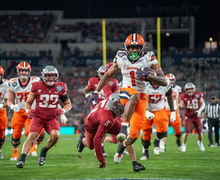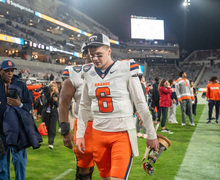Paul Flanagan’s St. Lawrence roots give upcoming match extra significance
Ally Walsh | Staff Photographer
Paul Flanagan went to five Frozen Four's with St. Lawrence and made the championship game once.
It may have been the happiest St. Lawrence assistant coach Ted Wisner has ever been after a shutout loss.
To Wisner, St. Lawrence’s 3-0 loss to Syracuse on Feb. 4, 2014 at War Memorial Arena was more than just the first-ever meeting between the two programs — it was the first battle of long-time friends, former co-workers and between a coach and the coached.
The coach, Syracuse’s Paul Flanagan, was born and raised in Canton, New York, home of St. Lawrence. He played for the Saints, then became assistant coach of the men’s team, eventually taking over the women’s program from 1999-2008. He went to four straight Frozen Fours, won a school-record 31 games in the 2005-06 season and became one of the most successful women’s college hockey coaches of all time.
Then, in 2008, he left. Flanagan hasn’t coached at St. Lawrence for over a decade, but his legacy remains. When St. Lawrence (4-4-3, 1-1-1 Eastern College Athletic) comes to War Memorial Arena on Saturday for another match against Syracuse (2-10, 1-1 College Hockey America), friends, former co-workers and past players will once again face off.
“There’s so many generations of both men’s and women’s players that have had a (Paul) Flanagan connection,” Mare MacDougall, a St. Lawrence assistant said.
Flanagan got his start as a hockey coach at Canton High School in the 1980s, coaching teenagers such as Chris Wells and Wisner — who now make up two-thirds of the St. Lawrence coaching staff.
Wells played under Flanagan again when Flanagan became the men’s assistant at St. Lawrence, and even filled his role when Flanagan moved to the women’s team in 1999. When Flanagan decided to take on the new challenge of starting a Syracuse women’s hockey program from scratch, Wells once again filled his role.
Initially, Flanagan’s decision to come to Syracuse shocked some members of his coaching staff, such as MacDougall, who took the St. Lawrence assistant job in 2007 because of the opportunity to work alongside Flanagan. However, sitting on the shoulder of a Toronto highway during a recruiting trip, she learned of Flanagan’s decision.
“The initial sting of it,” MacDougall said. “Oh my gosh, I only got to work with him for one year.”

Eva Suppa | Digital Design Editor
Just a day after Flanagan took the Syracuse job, fellow Canton native Wells was hired as his replacement.
Wells said he was molded, in part, by every hockey coach he’s ever had, from Flanagan to broadcaster Pierre McGuire, but his high school coach and college assistant taught him “when to turn it on and when to turn it off.” The biggest thing Wells learned from Flanagan was to serve the program and community, not for acknowledgement, but “because you want to do it,” he said.
“You’ll never hear Wellsy say ‘my team’,” MacDougall said. “It’s always us, our.”
Like Flanagan, Wells is a players-first coach, said Wisner. Wells has replicated Flanagan’s tendency to let the players in the locker room dictate the program’s culture, MacDougall said.
“I’d like to think that there’s still a little bit of part of me still there,” Flanagan said. “Just in the fact that I’m so close to Wellsy, Boomer (Wisner) and Mare. You know, at times it feels like you never really left the place.”
But Flanagan did leave, and now his former and current team compete against each other both on and off the ice.
Sharing a similar recruiting base, Wisner often sees Flanagan at rinks across the United States and Canada, where each program “wins some battles,” he said, but the friendship they have transcends the business side of the sport. On recruiting trips, they’ll often share hotel rooms.
When they play against each other, they’ll often give each other postgame dinner recommendations. For MacDougall, playing Syracuse is a chance to prove that St. Lawrence is “in good hands” since Flanagan’s departure.

Karleigh Merritt-Henry | Digital Design Editor
Flanagan’s legacy lives on with the coaching staff he coached worked alongside, but also lives in their program’s record books. In 2018, Flanagan was inducted as a “Legend of Appleton,” celebrating his impact as a coach and player. The women’s program’s 100-point club is also named in honor of him.
While introducing Flanagan during the award ceremony, Wells brought out a t-shirt he had received during Flanagan’s bachelor party to soften the crowd. But it was Flanagan who got the last laugh. Wells had given no thought to the color of tie he was wearing, but Flanagan was quick to point out that Wells’ orange tie may be signalling his habit of following in Flanagan’s footsteps, whether it be as men’s assistant or women’s head coach, might not be over.
“We always joke about it,” Wells said. “But I’m quite happy where I am right now.”
Under Wells, the Saints have not been able to return to the Frozen Four, or complete Flanagan’s biggest regret about his time at St. Lawrence – not winning a national championship.
But if any coach is able to bring the title to St. Lawrence, Flanagan’s impact on his hometown program is undeniable.
“I think anyone who talks about St. Lawrence women’s hockey talks about not only what we’re trying to do now,” Wisner said, “But where the program has been in the past.
“He’s always going to have his name on the program.”
Published on November 13, 2019 at 10:52 pm
Contact Mitchell: mbannon@syr.edu





